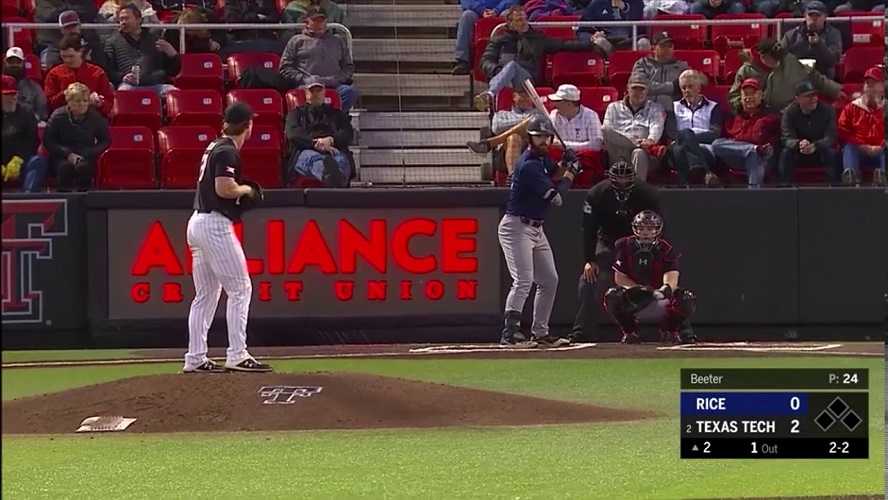
Next up is one of my favorite prospects in the system, who was also one of my favorite draft picks since following the draft closely.
——
Previous Entries
- Introduction
- Dodgers No More
- 50-41
- 40-31
- 30-21
- 20-11
- No. 10 – Andy Pages
- No. 9 – Ryan Pepiot
- No. 8 – Kody Hoese
——
I’ve included Future Value (FV) grades and risks for the Top 50 prospects. For example, if a guy gets a “50 low,” he has a really good chance to be an average player at his position. If a guy gets a “55/High,” there’s a good chance he won’t reach that ceiling, but the potential is there. The grades are 20-80 (50 is average), and the risks are as follows:
- Low: Players who are usually older, have debuted, are relievers and/or have higher floors than ceilings
- Medium: Players who are a mix of younger and older, usually have higher floors
- High: Players who are usually younger with potential, but also question marks
- Extreme: Players who are generally younger with star potential, but a ton of question marks
This is to show what value a player might provide at the MLB level. The higher the risk, the less likely a player will reach that ceiling.
——
Editor’s Note: I am not a scout (#notascout). I am an amateur when it comes to evaluating players. I don’t claim to be a pro, I just want to pass along the information I observe/obtain to the people. Notes and comments are based on personal observation, talking to sources, reading scouting reports and watching video. For future entries in this series: All ratings in the charts below are on the standard 20-80 scouting scale, where 50 is roughly average, 80 is elite and nearly unattainable and 20 is unacceptably poor. Enjoy.
Other Notes: “Role” is a realistic future role (slightly optimistic in some cases). Age is the 2020 season age for the player (June 30 is the cutoff date). “Comps” are usually the best-case scenario based off stature and production. They in no way guarantee the player will mirror the career of the comp.
——
Rating Key
| 80 — Elite |
| 75 — Borderline Elite |
| 70 — Plus-plus |
| 60-65 — Plus |
| 55 — Above-average |
| 50 — Average |
| 45 — Fringe-average |
| 40 — Below-average |
| 30-35 — Poor |
| 20-25 — Very Poor |
7. Clayton Beeter
| DOB: 10/9/98 | Age: 22 | Height: 6’2 | Weight: 220 | Bats: Right | Throws: Right | Position: RHSP |
Acquired: Second round (competitive balance), No. 66 overall of 2020 MLB Draft, Texas Tech University, $1,196,500 signing bonus
Strengths: Plus-fastball, borderline plus-plus breaking pitches, starter’s profile
Weaknesses: Injury history, limited experience, questions about long-term starting
Key statistics: N/A
Role: No. 2 SP/high-leverage RP
Player comparison: Chris Stratton (with more velo)
Summary: Beeter was the No. 2 player on my final Big Board on draft day 2020. It was surprising to see him fall so far down the board, but the Dodgers nabbed him at No. 66 and that could turn out to be quite the steal. Before the shutdown, he logged 21 innings for Texas Tech and posted some impressive numbers: 2.14 ERA, 40.2 K%, 4.9 BB%. He’s probably not a true 35 K-BB% guy, but the stuff is there to be an impact starter.
He operates with a 93-97 MPH fastball that has touched 98 MPH and has a high spin rate. It features rising action and checks all the boxes the Dodgers look for in their power pitching prospects. He backs it up with a low-80s curveball that has flashed double-plus. The 12-6 shape and velocity gives it a power curve profile and should be among the league leaders in spin. He also has a mid-80s slider that has flashed plus-plus, but it draws mixed reviews from scouts. Some think it’s a solid-average offering, some think it’s his best pitch. He also has a “show me” changeup that needs a lot of work.
Beeter has a nearly over-the-top arm slot that can be a bit deceptive, but could also be a partial explanation for the arm issue he has had in his collegiate career. He also didn’t pitch in the instructional league because of a forearm issue. As a Tommy John recipient in 2017, that’s less than ideal. He also doesn’t have a long track record of starting, as he pitched out of the bullpen in 2019 for Tech. He’s athletic enough to repeat his delivery and the Dodgers’ player development staff might be able to iron out the wrinkles.
He has the best stuff in the system, hands down. The injury history and lack of experience is the reason he isn’t ranked higher — and, conversely, why he was still available at No. 66. He has No. 2 starter upside. If he has to move to the bullpen, he could be a high-leverage reliever with some of the best stuff in the game. Despite not being invited to big league camp and not pitching in instructs, he should still begin the season in Low-A with Rancho Cucamonga with a chance to move quickly to High-A Great Lakes.
Video
| Tool | Present | Future |
| Fastball | 35 | 60 |
| Curveball | 40 | 70 |
| Slider | 35 | 60 |
| Changeup | 25 | 40 |
| Command/Control | 30 | 50 |
| FV/Risk | 60 | Extreme |
2020 Ranking: NR
2021 Location: Low-A Rancho Cucamonga/High-A Great Lakes
ETA: 2023
——
Next Up: Prospect No. 6
 Dodgers Digest Los Angeles Dodgers Baseball Blog
Dodgers Digest Los Angeles Dodgers Baseball Blog